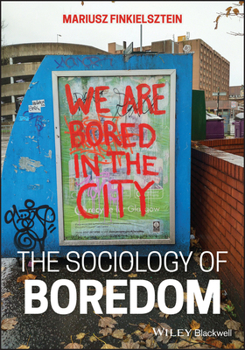The Sociology of Boredom: We Are Bored in the City
The first integrative sociological work on boredom, providing a novel exploration of boredom as an emotion dependent on socio-cultural circumstance
The Sociology of Boredom offers fresh insights into one of the most widespread, yet neglected, human emotions, reflecting on the nature of boredom and its connections to various spheres of social life. Author Mariusz Finkielsztein offers detailed analyses of boredom in contexts such as social change, social mobilization, the workplace, utopian projects, political and military movements, consumerism, and religion.
Approaching boredom from both macro and micro sociological perspectives, The Sociology of Boredom provides a detailed picture of the social production of boredom in modernity and late modernity. Each chapter contains in-depth analysis of boredom from a different sociological vantage point, including theories of social structure, interactionist theory, historical sociology, sociology of emotions, and social anthropology. Throughout the text, Finkielsztein introduces new ways of conceptualizing, interpreting, and perceiving boredom while developing an innovative relational-expectational theory of boredom.
Based on original research conducted over more than a decade, The Sociology of Boredom: Provides a thorough overview of previous studies and recent theoretical developments Presents essentialist, constructivist, and anthropological viewpoints on boredom Describes modern concepts of busy boredom and consumer boredom, proposing that boredom is a driving force of consumer capitalism Investigates smart boredom and the theory of boredom in the information society Discusses the characteristics, possible causes, and consequences of workplace boredom Examines the boredom of marginalized groups worldwide, including the unemployed and homeless, refugees, women, and indigenous peoples
Compiling a broad range of analyses of boredom in a single volume, The Sociology of Boredom is essential reading for upper-level undergraduates, postgraduates, university lecturers, and academic researchers in sociology and similar disciplines, particularly those involved in studies on emotions or boredom studies.





